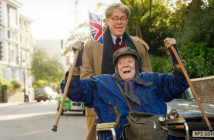Cast: Urszula Modrzynska, Grazyna Staniszewska, Andrzej Szalawski
Director: Aleksander Ford
Country: Poland
Genre: Adventure | Drama | History | Romance | War
Editor’s Notes: The following review is part of our coverage for Martin Scorsese Presents: Masterpieces of Polish Cinema which runs from February 5th to 16th. For more information on this film series visit filmlinc.com and follow The Film Society of Lincoln Center on Twitter @FilmLinc.
There’s something irresistible about a good historical epic. Perhaps it’s the opportunity to major on spectacle that allows for a uniquely cinematic experience. With a vast number of moving parts, Aleksander Ford’s 1960 picture is certainly an experience. Epic in scope, scale and running time, unashamedly one-sided and tremendous fun at heart, it’s not hard to see why it became such a massive hit in Poland and the wider Soviet Union.
The action unfolds against the backdrop of the Polish-Lithuanian-Teutonic War, a conflict that saw the Teutonic Knights, a crusading military order, finally pushed back by a combination of Polish and Lithuanian troops. The climax of the film, and the central event of the war, is the Battle of Grunwald in 1410 that saw the rigid and heavily armoured Teutonic formations suffer a devastating defeat at the hands of their plucky opponents. The parallel between the Second World War and the defeat of the Nazis is not hard to spot.
Epic in scope, scale and running time, unashamedly one-sided and tremendous fun at heart, it’s not hard to see why it became such a massive hit in Poland and the wider Soviet Union.
 While this plays throughout, Ford’s film, adapting Henryk Sienkiewicz’s book, is rooted in several human stories. When Jurand (Andrzej Szalawski) refuses to roll over for the Teutonic Order, he soon finds himself the victim of brutal vengeance. It falls to young Zbyszko (Mieczyslaw Kalenik), supported by his uncle Ma
While this plays throughout, Ford’s film, adapting Henryk Sienkiewicz’s book, is rooted in several human stories. When Jurand (Andrzej Szalawski) refuses to roll over for the Teutonic Order, he soon finds himself the victim of brutal vengeance. It falls to young Zbyszko (Mieczyslaw Kalenik), supported by his uncle Ma
ko (Aleksander Fogiel) to aid Jurand’s daughter Danusia (Grażyna Staniszewska) while fighting his growing attachment to Jagienka (Urszula Modrzyńska). As the different factions bump up against each other, the march towards war grows in strength through a series of ambushes, betrayals, duels and kidnappings.
Ford has not set out to recreate a balanced account of the war. The Teutonic Order is very clearly the bad guy here. They plot and scheme against everyone else, think little of resorting to murder, kidnapping and rape, and seem to have no limit to their quest for more land and money. As they try to bully and hector the Poles into submission, their rapaciousness shows no bounds. It’s only on the odd occasion that they stop to contemplate what they’ve become, remarking on the sins required to serve Christianity. At times they veer too close to pantomime villain, but the point remains crystal clear.
The Poles on the hand are hard working folk, bluff and to the point and not willing to be pushed around. While they are shown to take a cunning approach to battle, their diplomatic relations are much more straight forward. Not for them the weasely ways of their foe. They work the land, they defend the land and they respect their traditions. What they don’t accept is a foreign power trying to override their way of life.
The real star though is the battle sequences. Ford chooses to shoot many of them up close, cameras trained on the faces of horsemen as they slash left and right in the heat of conflict. The crunching blows and tramping feet are enhanced by martial music. It feels as if the battle has come to life again in front of us, the sense of chaos brilliantly captured.
Art always tells as much about the present as it does the past, usually more, and The Knight of the Cross does not break with this. However, outside of the contemporary historical allusions, the story plays out as a conventional medieval epic. Chivalry is the order of the day, with behaviour as brave as it is stupid. Zbyszko thinks nothing of charging the first Teutonic knight he spots to try and claim peacock feathers for his love. He’s also unwilling to save his own life if it means dishonouring himself by dressing in female clothing. Crimes must be avenged, maidens praised to the heavens and duties taken seriously.
 Many of these conventions are delivered fantastically well. Zbyszko’s foolhardy stupidity sees him volunteer for fights all over the shop. The end result is a fantastic duel that sees whirling axes hammer down on shields until someone loses the strength to fight on. Watching Jurland standing up to hostile questioning by lifting a man above his head and tossing him aside like bedding is both laughable and mightily impressive.
Many of these conventions are delivered fantastically well. Zbyszko’s foolhardy stupidity sees him volunteer for fights all over the shop. The end result is a fantastic duel that sees whirling axes hammer down on shields until someone loses the strength to fight on. Watching Jurland standing up to hostile questioning by lifting a man above his head and tossing him aside like bedding is both laughable and mightily impressive.
Just as impressive is the set design and costumes. The remote forest roads and rickety wooden forts feel like they’ve emerged fresh out of the fifteenth century. The Teutonic Knights cut dashing figures in their white tunics adorned with a black cross, while the rainbow colours of the other denizens of this world, dressed only in the brightest of outfits, fit the image of nobility perfectly. Winter, when it falls, has rarely looked this bodingly attractive. Blustery snow envelopes legs and traps travellers, the countryside draped in a faintly sinister white cover.
The real star though is the battle sequences. Ford chooses to shoot many of them up close, cameras trained on the faces of horsemen as they slash left and right in the heat of conflict. The crunching blows and tramping feet are enhanced by martial music. It feels as if the battle has come to life again in front of us, the sense of chaos brilliantly captured. Men scatter in all directions as horses charge, often running straight into their own demise. When the final fight finishes, and the corpses are littered across the torn up field, they feel like fallen soldiers and not a collection of extras rounded up for the afternoon.
Black Cross may run for close to three hours but it pays back by providing a rollicking good time. From in amongst the stampeding horses and clouds of dust, the romantic conversations shimmering with sexual intent and diplomatic bargaining that is only going to end one way, a great piece of entertainment emerges, still dazzling over half a century later.
[notification type=”star”]85/100 ~ GREAT. Relying a little too much on convention and one dimensional villains, this remains an impeccably crafted and tremendously fun historical epic that entertains every step of the way.[/notification]



